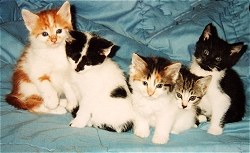Choosing the right kitten
|
Unless you know a lot about cats and kittens, choosing which kitten to adopt is not as easy as it seems. Kittens are not little clones, far from it. Like human children, each kitten has a unique personality; a personality which will influence what type of adult cat it will grow into. You are going to be the most important person in this little animal’s life, so it’s important that you should be right for each other. |
The first step though, and among the most important is to check is that the kitten is healthy. There is nothing more heartbreaking than losing a kitten to illness. So before you invest a lot of emotion in the little creature, assess her health carefully. Most reputable breeders have each litter examined by a vet and will not put up an unhealthy kitten for adoption. However, not all breeders are up to this standard. You may also adopt a kitten from a friend’s cat, or see one of those notices ‘kittens free to a good home’. So you should not assume every kitten is healthy. Below is a list of things to watch out for but if you are not sure you can always make the adoption conditional upon a clean bill of health from the vet.
Health points to note when adopting a kitten
One of the most important things is that you should not adopt if the kitten is too young. The first few weeks of life are critical in a kitten’s development. It is at this time that she learns most of the crucial skills from her mother. For more information about the development of the kittens see our article: 'The life of a kitten - early development'. No reputable breeder will put up a litter for adoption before the kittens are at least three months old, so make this your minimum age.
You can tell the approximate age of a kitten by looking at her teeth. Look for a full set (26 teeth) of bright, white teeth in pink gums. All 26 baby teeth should be present at around 6 weeks of age. If you see no teeth or the teeth are just starting to emerge from the gums, then the kitten is still too young for adoption. If the kitten does not have blue eyes, then it is probably over nine weeks old. All kittens are born blue-eyed, and if this is going to change, this happens around week 9. Remember that white cats which keep their blue eyes have a genetic predisposition to deafness.
Next, observe the fur. It should be clean and shiny. A dull or dirty coat is a warning sign that something is wrong. Look carefully for parasites such as fleas, ticks or mites. Run your fingers along the kitten’s body, feeling for any lumps and ridges. Check for bald patches which may indicate a fungal infection called ringworm (which can be transmitted to humans). Next check the kitten’s eyes. They should be clear with no discharge on the side. Also look for redness or swelling.
The nose of a healthy kitten should be cool and slightly damp but not wet. Any nasal discharge or sneezing can be an indication of infection, for example cat flu, which can be life-threatening. Finally, check the kittens ears. They should be clean without any discharge. An unpleasant smell or a black, waxy substance indicates parasitic ear mites or an infection which needs treatment. Mites can be very itchy and the kitten’s scratching can result in a further self-induced infection.
Assessing a kitten’s personality

A timid kitten may develop into a very affectionate cat which loves nothing more than sleeping on your lap. But there will be a slightly longer and harder journey to get to that stage than with an easy-going kitten which crawls into your hand the minute you approach the litter. A kitten’s personality traits are important in shaping an adult cat, but environmental factors and human interaction make a big difference. It’s important to be aware what kind of kitten you are getting, and to know what kind of kitten you want.
One of the best ways to assess kitten’s a temperament is to observe her with her litter-mates. If she is shy and withdrawn with the other kittens, she will probably also be shy and withdrawn with you. You may end up with an elusive and nervous cat which does not like being handled. These are not your natural lap cats. Nevertheless, if you can spend a lot of time with the kitten and are prepared for a challenge, there can be nothing more rewarding than seeing a shy kitten transformed into an assertive adult cat. However, if you are working or spending a lot of time outside the house, meaning that the kitten will be largely on her own, it is definitely better to look for a pet with a more easy-going temperament. Also if you already have other pets, a nervous, shy kitten is unlikely to do well in this environment. This is also true for households with small children.
On the other side of the spectrum there are overaggressive kittens - the feline equivalent of little thugs. These kittens can be identified by watching how they play with their litter-mates. For them a play-fight is not a game, it is the real thing. Watch for a stiffened body, eyes with contracted pupils and ears flattened against the side of the head. Although again there is no hard and fast rule, these kittens are more likely than not to develop into cats which will bite, scratch or attack without any provocation. Cat bites and scratches are painful and life with an aggressive cat can quickly turn into an uphill experience.
For most people an ideal kitten is alert and bouncy but not overly aggressive. If you see a kitten you like, ask the breeder to bring her to you. See how she responds to being picked up. If she does not appear frightened and is eager to play, you may have picked a winner.
Energetic and playful cats are great for a household with young children. If you would like a bit more peace and quiet you may prefer to choose a kitten who is more cool and collected. The cool kitten is calm when picked up, sits quietly on your lap and is laid back and at ease as she goes about her business. The cool kitten will likely grow into a relaxed, non-destructive adult cat who loves to sit quietly and observe the world going by, or nap peacefully on a comfortable sofa.
Some may prefer a cat with a non-assertive personality. It is for example preferable to have a cat that quietly watches you at the computer to one that enthusiastically participates by walking over the keyboard. Some humans and cats like to have someone keeping them company without getting overly intimate about it. Every human and every cat is an individual - don’t make the cat spend the rest of its life regretting your impulsive decision. Take your time, and get it right.
Most breeders will allow you to pick the kitten you would like fairly early and then will look after her till she is old enough for adoption. You can use this waiting time to visit the kitten a couple of times and interact with her so that she can get to know you before the traumatic day of being taken to her new home. With your new kitten safely home, you can congratulate yourself on making a good start - but what kind of cat your new friend turns into is now up to you!

